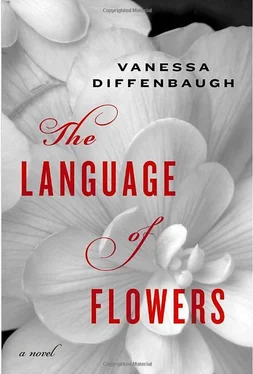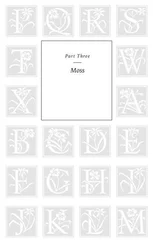Catherine had never, not even in illness, left Grant. Unsupported and alone, she had managed what neither Grant nor I had been able to do: keep and raise a child. The respect that hit me was deep and unexpected. I looked at Grant, to see if he felt it, too. His eyes, glassy and full, were fixed on his mother’s drawings.
“She loved you,” I said.
His tongue curled out of his mouth, pressed against his upper lip. “I know.”
There was a hint of surprise in his voice, and I didn’t know if he was surprised that his mother had loved him so much or surprised that he finally understood the depth of her feeling. Her mothering had been far from perfect. But Grant, grown now, was strong, loving, and a successful farmer. Sometimes he was even happy. No one could say she hadn’t raised him well, or at least well enough. I felt a wave of gratitude for the woman I would never meet, the woman who had created the man I loved.
“How did she die?” I asked.
“One day she didn’t get out of bed. When I went to her, she wasn’t breathing. Alcohol and her prescriptions, the doctors said. She knew she wasn’t supposed to drink, but she often snuck a bottle to bed. In the end, it was too much.”
“I’m sorry.”
I was. I was sorry for Grant, and sorry I wouldn’t meet her. Sorry Hazel would never know her grandmother.
I squeezed Grant a final time. Inching my arm out from underneath him, I kissed his forehead.
“You’ve been good to Hazel,” I said, my voice unsteady. “So good. Thank you.” I crawled over his body and stood up.
“Don’t go,” he said. “Stay here with me. Please. I’ll cook you dinner every night.”
I scanned the drawings on the wall: crocus, primrose, and daisy, flowers for a young girl. I could not look at Grant, could not think about his cooking. If I looked into his eyes even one more time or smelled anything in the oven, it would be impossible for me to leave.
“I have to go,” I said. “Please don’t ask me to stay. I care too much about my daughter to interrupt her life now, when she’s happy, cared for, and loved.”
Grant stood up. He wrapped his arms around my waist and pulled me to him. “But she doesn’t have her mother,” he said. “Nothing makes up for that.”
I sighed. His words were not guilt-ridden, forceful, or said to be persuasive.
They were true.
I walked down the stairs, and Grant followed close behind. He passed me in the dining room and swept open the front door. I walked through the passageway quickly.
“Come for Thanksgiving,” he said. “There’ll be roses.”
I started walking toward the road, my steps slow and heavy. Though I’d refused Grant’s invitation to stay, I didn’t, in fact, want to leave. Having heard my daughter’s giggle, having witnessed Elizabeth as a mother, again—her voice as firm and gentle as I remembered—I couldn’t bring myself to walk away. I didn’t want to drive back across the bridge and retreat into my blue room. More than anything, I realized with surprise, I didn’t want to be alone.
I waited for the front door to click shut. When it did, I turned and ducked into the first greenhouse.
I needed flowers.
The bouquet I hadassembled at Grant’s bobbed between my knees as I drove the short distance back to Elizabeth’s.
I parked at the entrance to the property, jogging up the long driveway. From the kitchen window, soft orange light glowed. This late in October, I had expected to find Elizabeth already on her nightly tasting tour, Hazel in tow, but it looked as if they were still finishing dinner. I wondered how she had managed the vineyard with a baby, and whether the quality of the harvest would suffer as a result. I couldn’t imagine her allowing it.
On the porch, I paused, peering in the front window. Hazel sat at the kitchen table, buckled into a high chair. She’d been bathed and dressed since I’d glimpsed her in the garden. Her wet hair, darker and curlier, was parted on the side and pulled back with a clip. A glossy green bib fastened behind her neck was splattered with something white and creamy, and she licked the remains of what she’d eaten from her fingertips. Elizabeth’s back was to me, washing dishes at the sink. When I heard the water turn off, I stepped behind the closed front door.
Bowing my head, I dipped my nose into the bouquet I’d assembled. There was flax, and forget-me-not, and hazel. There were white roses and pink ones, helenium and periwinkle, primrose, and lots and lots of bellflower. Between the tightly wrapped stems I’d packed velvety moss, barely visible, and I had sprinkled the bouquet with the purple and white petals of Grant’s Mexican sage. The bouquet was enormous, and not nearly enough. Taking a deep breath, I knocked on the door.
Elizabeth crossed in front of the window and swung the door open. Hazel straddled her hip, her cheek against Elizabeth’s shoulder. I held out the flowers.
A smile spread across Elizabeth’s face. Her expression held recognition and joy but not the surprise I had expected. As she looked me up and down, I felt like a daughter returning from summer camp to a mother who had worried unnecessarily. Except instead of summer camp it had been my entire adolescence, emancipation, homelessness, and single parenthood, and I couldn’t rightly say that Elizabeth’s worry had been unwarranted. But now, the years that had passed since I’d left her home felt short and far away.
Pushing open the screen, she reached past the bouquet and wrapped her arm around the back of my neck. I fell against the shoulder Hazel hadn’t claimed, and we stood there, in an awkward embrace, until Hazel began to slip off Elizabeth’s hip. She jostled her back up, and I pulled away to look at them both. Hazel’s face was hidden; Elizabeth wiped tears away from the corners of her eyes.
“Victoria,” she said. She closed her hand around my fingers, and we clutched the bouquet together. Finally, she took it from me. “I’ve missed you.”
Elizabeth held the screen door open and motioned with her head for me to come inside. “Have you eaten? There’s leftover lentil soup, and I made vanilla ice cream this afternoon.”
“I just ate,” I said. “But I’ll have ice cream.”
Hazel lifted her head from Elizabeth’s shoulder and clapped her hands together.
“You had yours already, little one,” Elizabeth said, kissing the top of Hazel’s head and walking into the kitchen. She set her down on the floor, where the baby clung to the backs of Elizabeth’s legs. Leaning from the freezer to the cupboard without taking a step, Elizabeth succeeded in retrieving a metal tub of ice cream, a dish, and a spoon.
“Up you go,” she said when the bowl was full. Hazel reached up, and Elizabeth bent down to scoop her up with one arm. “Let’s sit at the table with your mother.”
My heart raced at Elizabeth’s casual reference to my motherhood, but Hazel, of course, did not flinch.
I washed my hands at the sink and sat down. Elizabeth slid the high chair to face me, but when she bent to put the baby inside, Hazel shrieked and held on to the back of Elizabeth’s neck.
“No thank you, Aunt Elizabeth,” she said calmly, cutting Hazel’s scream short. She pulled the high chair out of the way and slid a chair into its place, then sat down with Hazel pressed against her, chest to chest.
“She’ll get used to you,” Elizabeth said. “It takes her a minute to warm up.”
“Grant told me.”
“You saw Grant?”
I nodded. “Just now. I came here first, but when I saw you out in the garden, with Hazel, I was so surprised I turned and ran.”
“I’m glad you came back,” she said.
Читать дальше












